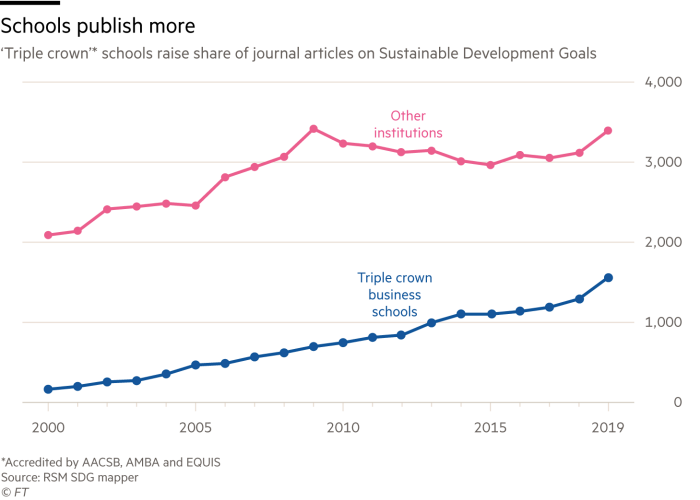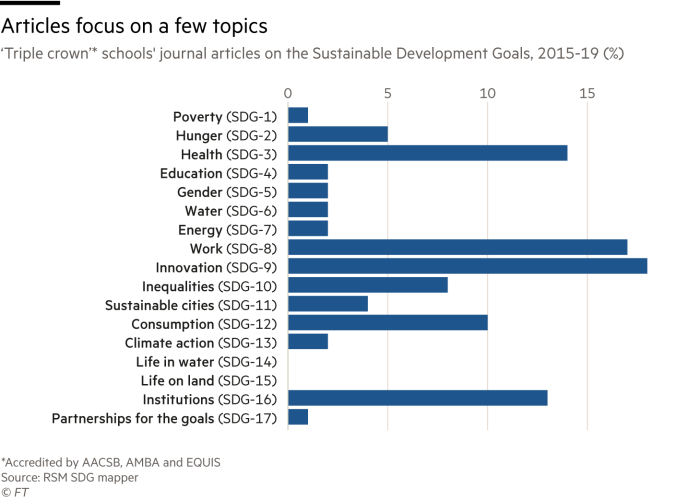Wilfred Mijnhardt has a trouble. Europe is household to some of the world’s oldest and most prestigious small business universities, and it has been at the forefront of a great deal of the world-wide innovation in training and analysis on sustainability.
But when he analyses institutions’ effectiveness dependent on their position in over-all rankings, permit by itself their academic analysis output, he finds a major mismatch with these accomplishing most to foster responsible small business education.
Mijnhardt, plan director at Rotterdam University of Management at Erasmus University, is a single of a escalating variety of experts checking out strategies to much better seize these traits. It is also a issue on which the FT is reflecting and canvassing sights in conjunction with academic and sustainability teams. Notably, Mijnhardt has mapped the back links between the small business schools’ analysis output and the UN’s sustainable development goals (SDGs).
“Business universities are lagging guiding [other disciplines],” he suggests. “They imagine that if they create a several publications that depend for rankings and accreditation applications, they are accomplishing analysis. But this planet is a great deal even bigger than that and academic lifestyle is so a great deal a lot more.”
Mijnhardt analyzed article content on SDGs prepared by small business college workers due to the fact 2015 that were posted in the FT50 checklist of influential journals. He identified that the prime institutions are ever more concentrated on the subject, with potent output in Europe from universities at the universities of Glasgow, Leeds and St Gallen, for instance.
But there are large gaps, with local weather alter-connected topics explored much a lot less in these article content than themes these as poverty reduction and innovation. Some of the article content with the biggest SDG relevance and impression are posted in a lot more obscure and a lot less properly-regarded journals.
Mijnhardt suggests small business universities have moved a lot more gradually than other academic departments to function on a lot more interdisciplinary, collaborative and socially relevant themes. A person explanation is they are a lot less reliant on — and accountable to — external analysis funders which are ever more concentrated on the priorities of the SDGs. Rather, their analysis tends to be indirectly subsidised by superior tuition service fees or donations.
Jerry Davis, affiliate dean for small business and impression at Ross University of Business at the University of Michigan, is a lot more nuanced. “Business universities ironically are a single of the previous preserves the place you are free to follow your head the place it goes, simply because you are not reliant on federal government or corporate funding,” he suggests. “We have most likely a lot more academic flexibility to uncover things.”

Colleges with the prestigious ‘Triple crown’ of accreditation from the AACSB, AMBA and EQUIS are publishing a lot more article content connected to UN sustainable development goals in the FT50 checklist of influential academic journals used in small business education rankings
However in observe, as a founding member of Responsible Exploration for Business & Management (RRBM), a network of lecturers pushing for “credible and useful research”, he suggests a lot more requires to be carried out to reorient his peers’ pursuits to projects and publications that present better societal impression.
A person critique of current small business college rankings, like the FT’s, is that their calculations do not focus so a great deal on these topics. Rather, they draw on info details these as salaries that do not replicate — and might even most likely undermine — escalating desire by college students, faculty and businesses for a better emphasis on these social purpose, like in their academic output.
But there is a a lot more essential situation for these eager to carry about alter: the deficiency of consensus on strategies to meaningfully assess these pursuits. Other assessments concentrated on the SDGs rely greatly on subjective, qualitative judgments by college students and faculty. They are constrained by reference to their individual activities and institutions, without an external benchmark.

Business college lecturers are inclined to focus greatly on certain SDGs, most notably wellness, innovation, function, use and institutions, whilst subjects these as the earth, poverty, education and gender receive fairly very little notice
It is particularly complicated to consider the impression of “environmental, social and governance” variables in classroom training or alumni occupations. Even in academic analysis, long scrutinised by means of “bibliometrics” checking out the info all-around posted analysis, there is very little settlement on which measures to use.
Concentrating on the content of article content that refer to the SDGs provides a proxy on the extent of exercise all-around these troubles. But it gives only a crude yardstick for the originality, price or applicability of the fundamental analysis.
Experts these as Amanda Goodall, affiliate professor at The Business University, Town, University of London (formerly Cass), advocate increasing the array of publications that are taken into account further than these in the widely recognised and prestigious FT50, to involve a lot more interdisciplinary and specialist journals. That would allow for for a broader range of themes but could also dilute the perceived academic top quality.
Making use of citations by other lecturers of article content would assistance counter criticism by incorporating a peer assessment of the top quality of any publication. But it does not give an indication of the impression further than college partitions: the extent to which analysis is browse, shared and applied by firms, governments and other organisations. References to article content on social media supply some external validation of curiosity but also a superior diploma of “noise”. A much better method might be get into account references to academic analysis in the media, specialist weblogs and plan papers.
These are some of the troubles on which the FT, RRBM, the UN’s Principles of Responsible Management network and others, like the Globally Responsible Leadership Initiative of small business universities, are trying to get sights.
Inspite of the challenges, Prof Davis is optimistic about academia’s ability to build choice measurements, in portion simply because of fresh new curiosity in societal impression within education and further than. “Millennials have a rather potent perception of social justice and the effect of the function they do. I’m incredibly enthused by the coming generations,” he suggests.
Be sure to share your sights on how to much better evaluate academic analysis at ft.com/ft50






More Stories
Company Policy Does More Damage to Customer Service Than Anything Else
Offering Value and Service
Quality of Customer Service is Most Important